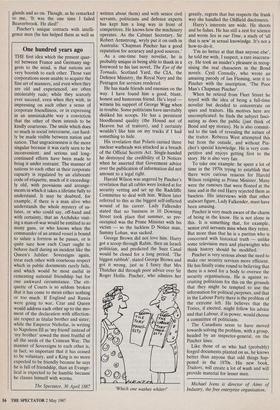One hundred years ago
THE first idea which the present quar- rel between France and Germany sug- gests to the mind, is that nations are very boorish to each other. Those vast corporations seem unable to acquire the fine art of manners, and even when they are old and experienced, are often intolerably rude; while they scarcely ever succeed, even when they wish, in impressing on each other a sense of corporate friendliness, or in expressing in an unmistakable way a conviction that the other of them intends to be kindly courteous. The smile which does so much in social intercourse, can hard- ly be made visible between nation and nation. That ungraciousness is the more singular because it was early seen to be inconvenient, and serious and long- continued efforts have been made to bring it under restraint. The manner of nations to each other in their corporate capacity is regulated by an elaborate code of etiquette, much of it exceeding- ly old, with provisions and arrange- ments in which it takes a lifetime fully to understand. It may be doubted, for example, if there is a man alive who understands the whole mystery of sa- lutes, or who could say, off-hand and with certainty, that an Archduke visit- ing a man-of-war would be entitled to so many guns, or who knows when the commander of an armed vessel is bound to salute a fortress as he passes, or is quite sure how each Court ought to behave itself during an incident like the Queen's Jubilee. Sovereigns again, treat each other with courteous respect which in public documents rarely fails, and which would be most useful in cementing national friendship but for one awkward circumstance. The eti- quette of Courts is so seldom broken that it has come to mean either nothing or too much. If England and Russia were going to war, Czar and Queen would address each other up to the mo- ment of the declaration with affection- ate respect as titular brother and sister; while the Emperor Nicholas, in writing to Napoleon III as 'my friend' instead of `my brother' sowed the most fruitful of all the seeds of the Crimean War. The manner of Sovereigns to each other is, in fact, so important that it has ceased to be voluntary, and a King is no more expected to be friendly because he says he is full of friendship, than an Evange- lical is expected to be humble because he classes himself with worms.
The Spectator, 30 April 1887


















































 Previous page
Previous page